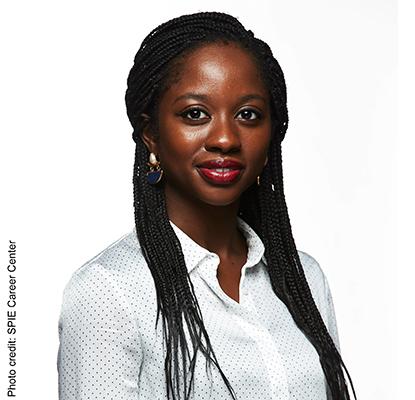Mercy Asiedu
Mercy Asiedu is a fifth year PhD candidate in biomedical engineering at Duke University who is passionate about bringing technological innovations in healthcare to under-resourced settings. Growing up in Ghana, Mercy became aware of healthcare inequalities, especially for women, that existed in the lower socio-economic parts of her home country. After completing her bachelor’s degree at the University of Rochester in New York, Mercy knew she wanted to work towards bridging the disparity gap of health systems between economically disadvantaged areas and more affluent ones.
While conducting research for her PhD, Mercy learned about the lack of tools for detecting cervical cancer, particularly in low-resource areas both globally and within the United States. Cervical cancer is highly preventable if the pre-invasive disease is detected in its early stages, but Mercy found that many women in medically underserved regions are dying from the disease due to the lack of effective screening techniques. In order to address this issue, Mercy recognized a need for affordable and accessible screening for women across the globe. This need led her to invent the Callascope, a low-cost, easy-to-use imaging device that is able to capture a magnified view of the cervix. The Callascope has the potential to be used both by doctors or by patients themselves. She also developed algorithms to automatically classify pre-invasive disease. Mercy was awarded the 2019 $15,000 “Cure it!” Lemelson-MIT Student Prize for her inventive work in the cervical cancer screening space.
In addition to solving problems related to women’s health, Mercy has proven to be a strong leader and mentor to her peers. As an undergraduate, she served on the executive board of the National Society of Black Engineers, where she helped to organize meetings and conferences. She also founded Ma’Frisah, a group on campus that showcases African cultures through dance. As a graduate student at Duke, Mercy founded and became president of the Duke African Graduate and Professional Students Association, where she has helped foster cultural and social awareness, planned mentorship events for undergraduates, and piloted a conference to highlight projects by students in Africa.
Giving back to her various communities is especially important to Mercy. Having been awarded a full scholarship to the University of Rochester for her undergraduate degree through the Zawadi Africa Education Fund—a program that awards academically gifted girls from disadvantaged backgrounds in Africa—Mercy now serves as a mentor to other African recipients who are applying to U.S. colleges. She has also volunteered her time to teach STEM (Science, Technology, Engineering, and Math) to elementary school girls in North Carolina and has mentored undergraduates in the lab at the Center for Global Women’s Health Technologies at Duke University.
Mercy will complete her PhD in June of 2019 and was recently awarded the Schmidt Science Post-doctoral fellowship, a post-doctoral program that aims to develop the next generation of interdisciplinary science leaders to tackle the world’s most significant problems and maximize scientific opportunities for society. With this fellowship, she will be conducting her post-doctoral research on developing machine learning algorithms for improved medical diagnostics.


